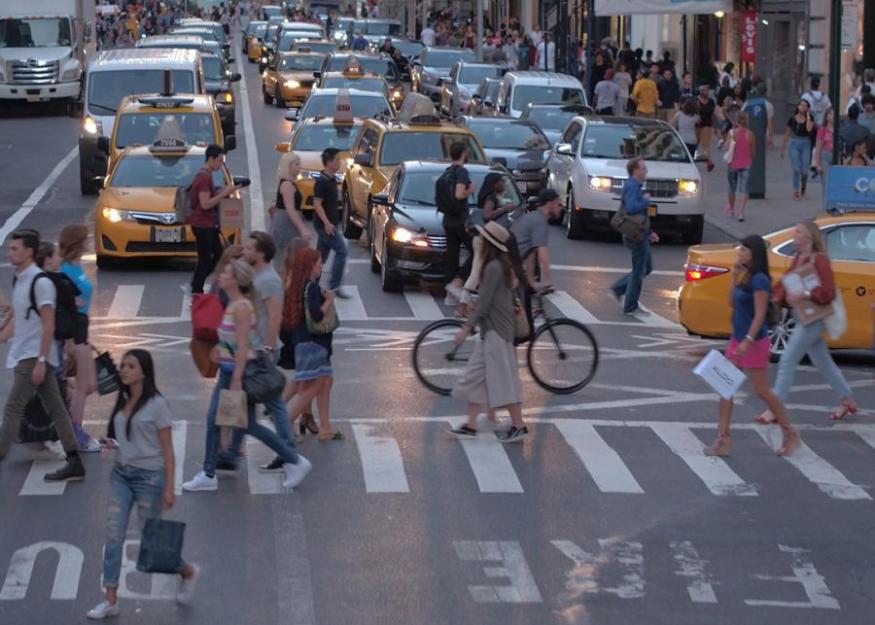Can Artificial Intelligence Improve the Efficiency of Smart Cities?
In the midst of rapid urbanization and growing populations, cities worldwide are embracing the concept of "smart cities" to enhance efficiency, sustainability, and quality of life. Smart cities leverage technology, data analytics, and interconnected systems to optimize urban infrastructure, services, and resources. Artificial intelligence (AI) plays a pivotal role in this transformation, offering a range of benefits and challenges that shape the future of urban living.

Benefits Of AI In Smart Cities
Enhanced Traffic Management:
- Real-time Traffic Monitoring and Analysis: AI-powered sensors and cameras collect real-time data on traffic flow, congestion, and incidents. This data is analyzed to identify patterns, predict traffic conditions, and optimize traffic signals.
- Intelligent Traffic Signal Control: AI algorithms adjust traffic signal timings based on real-time traffic conditions, reducing congestion, improving traffic flow, and minimizing travel times.
- Predictive Traffic Routing: AI-driven navigation systems provide personalized route recommendations to drivers, considering real-time traffic conditions, road closures, and user preferences.
Improved Public Transportation:
- Real-time Bus and Train Tracking: AI-enabled tracking systems monitor the location and status of public transit vehicles in real time, providing accurate arrival and departure information to commuters.
- Personalized Public Transit Recommendations: AI algorithms analyze user preferences, travel patterns, and real-time transit data to provide personalized recommendations for the most efficient and convenient transit routes.
- Dynamic Route Optimization: AI-powered systems optimize public transit routes based on demand, traffic conditions, and passenger preferences, improving overall efficiency and reducing travel times.
Efficient Energy Management:
- Smart Grids for Energy Distribution: AI-enabled smart grids monitor and control energy distribution, optimizing energy flow, reducing losses, and improving grid stability.
- Predictive Energy Consumption Analysis: AI algorithms analyze historical energy consumption data, weather patterns, and user behavior to predict future energy demand, enabling more efficient energy generation and distribution.
- Renewable Energy Integration: AI systems help integrate renewable energy sources, such as solar and wind, into the grid, optimizing energy generation and reducing reliance on fossil fuels.
Enhanced Public Safety:
- Real-time Crime Monitoring and Analysis: AI-powered surveillance systems analyze data from cameras, sensors, and social media to identify suspicious activities and potential threats in real time.
- Predictive Policing and Crime Prevention: AI algorithms analyze crime data, social factors, and environmental conditions to predict areas and times with a higher risk of crime, enabling targeted patrols and preventive measures.
- Improved Emergency Response Coordination: AI systems facilitate real-time coordination among emergency services, optimizing response times and resource allocation during emergencies.
Challenges And Considerations
Data Privacy and Security Concerns:
- Protecting Sensitive Personal Information: The collection and analysis of vast amounts of personal data raise concerns about privacy and data security. Robust measures are needed to protect sensitive information from unauthorized access and misuse.
- Ensuring Data Integrity and Confidentiality: AI systems rely on data integrity and confidentiality to make accurate predictions and decisions. Ensuring the integrity and confidentiality of data is crucial to prevent manipulation and unauthorized access.
Ethical and Societal Implications:
- Balancing Automation and Human Control: The increasing reliance on AI systems in urban management raises questions about the balance between automation and human control. Ethical considerations must guide the use of AI to ensure human oversight and accountability.
- Addressing Job Displacement and Economic Inequality: The automation of tasks by AI systems may lead to job displacement, particularly in sectors such as transportation and manufacturing. Addressing the potential negative economic and social impacts is essential.
Technological Limitations:
- Overreliance on AI Systems: Overreliance on AI systems without proper safeguards can lead to vulnerabilities and unintended consequences. Robust testing, validation, and human oversight are necessary to ensure the reliability and safety of AI-driven systems.
- Ensuring Robustness and Reliability: AI systems must be robust and reliable to handle complex urban environments and diverse scenarios. Ensuring the accuracy, fairness, and robustness of AI algorithms is crucial to avoid biased or erroneous decisions.
- Addressing Bias and Algorithmic Fairness: AI systems can perpetuate biases and discrimination if trained on biased data or algorithms. Addressing bias and promoting algorithmic fairness is essential to ensure that AI systems are fair, equitable, and inclusive.
Case Studies And Success Stories
Barcelona: Smart City Transformation with AI
- Citywide AI Platform for Data Integration and Analysis: Barcelona implemented a citywide AI platform that integrates data from various sources, enabling real-time monitoring and analysis of urban systems.
- AI-Powered Traffic Management and Mobility Solutions: AI algorithms optimize traffic flow, reduce congestion, and improve public transportation efficiency, resulting in reduced travel times and improved air quality.
- Improved Public Safety through Predictive Analytics: AI-driven predictive analytics identify areas and times with a higher risk of crime, enabling targeted patrols and preventive measures, leading to a reduction in crime rates.
Singapore: AI as a Cornerstone of Smart Nation Initiative
- AI-Driven Urban Planning and Development: Singapore leverages AI to optimize urban planning, design, and development, creating sustainable and livable urban environments.
- AI for Sustainable Energy Management and Resource Optimization: AI systems analyze energy consumption patterns and optimize energy distribution, leading to reduced energy waste and a more sustainable energy grid.
- AI-Enabled Public Services and Citizen Engagement: AI-powered platforms provide personalized public services, improve citizen engagement, and enhance the overall quality of life for residents.
Artificial intelligence holds immense potential to transform cities into more efficient, sustainable, and livable environments. By leveraging AI to optimize traffic management, public transportation, energy distribution, and public safety, smart cities can improve the quality of life for their residents. However, addressing challenges related to data privacy, ethical implications, and technological limitations is crucial to ensure the responsible and ethical implementation of AI in smart cities. As technology continues to advance, the integration of AI into urban systems will continue to shape the future of urban living, creating more interconnected, intelligent, and sustainable cities.
YesNo

Leave a Reply